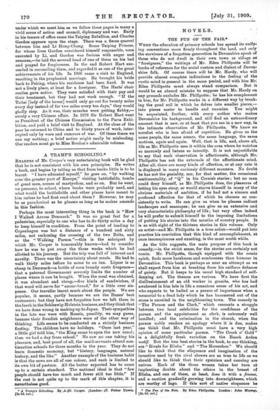A TRAMP'S SCHOOLING.* READERS of Mr. Cooper's very entertaining book
will be glad that he is not consistent with his own principles. He writes a book, and begins by telling us that from books little is to be learnt. "I have educated myself," he goes on, " by walking over the greater part of Europe," visiting battlefields, tombs of great men, scenes of martyrdom, and so on. But he went, we presume, to school, where books were probably used, and what would the battlefields and other places have meant to him unless he had first read about them ? However, he may be as paradoxical as he pleases as long as he makes amends in this fashion.
Perhaps the most interesting thing in the book is "How I Walked Across Denmark." It was no great feat for a pedestrian, especially to one who has to do thirty miles a day to keep himself in condition. From the point of landing to Copenhagen was but a distance of a hundred and sixty miles, not reckoning the crossing of the two Belts, and so the " Walking Parson "—this is the sobriquet by which Mr. Cooper is honourably known—had to consider how he was to put away the three weeks which be had allotted to his journey. But the trip was full of interest and novelty. There was the uncertainty about meals. He had to walk thirty miles before he came to an inn. Liquor is so cheap in Denmark—a bottle of corn brandy costs fivepence- that a paternal Government severely limits the number of places where it can be bought. When the meal was obtained, it was abundant and cheap,—five kinds of sandwiches, if that word will serve for " smear-bread," for a little over six- pence. Our traveller learnt much about the people. We are popular, it seems, partly because we are the Danes' best customers; but they have not forgotten bow we left them in the lurch in the Schleswig-Holstein business, and they think that we have done wrong in making up to Japan. Their sympathies in the late war were with Russia, possibly, we may guess, because their Swedish neighbours were of the other way of thinking. Life seems to be conducted on a strictly business footing. The children have no holidays. "Once last year," a little girl told him, "the King came to open the new canal ; then we had a day from school." He saw no one taking his pleasure, and, best proof of all, the maid-servants attend con- tinuation schools for three months in the year. They do not learn domestic economy, but "history, languages, natural history, and the like." Another example of the business habit is that the cows are all of one colour, and each is limited to its own bit of pasture. All the butter exported has to come up to a certain standard. The national ideal is that " few people should have too much and fewer still too little." If the rest is not quite up to the mark of this chapter, it is nevertheless good.
• A Tramp's Schooling. By ,.A. IN. Cooper. [London: IT. Fisher ITnwin. [33.6d. net.]






































 Previous page
Previous page